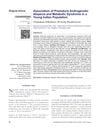Androgenic Alopecia in Men: The Significance of Genetic, Hormonal, and Metabolic Factors
December 2022
in “
Rossiiskii Zhurnal Kozhnykh i Venericheskikh Boleznei
”

TLDR Androgenic alopecia in men is mainly linked to family history, hormonal imbalances, and metabolic issues, but can also be influenced by lifestyle habits, environmental factors, and deficiencies in certain vitamins and microelements like copper.
The document presents a series of studies on androgenic alopecia (AA) in men, focusing on genetic, hormonal, and metabolic factors. The first study involved 500 men and found that 70% of participants with alopecia had a family history of the condition, 60% showed signs of hormonal imbalances, and 40% had metabolic issues like obesity and diabetes. The second study, involving 175 men, found that AA is associated with genetic predisposition and the action of androgens, but can also occur with normal hormonal levels due to non-genetic factors like harmful habits or environmental pollution. The third study, involving 50 patients, found that AA occurred against a background of multiple deficiencies of microelements and vitamins, but these deficiencies showed only weak correlations with significant changes in hair characteristics. The final study, involving 48 patients, identified a significant role of micronutrient relative insufficiency, particularly copper, in the development of AA. It also found that personalized correction of identified micronutrient status deviations allowed for highly effective therapy.












